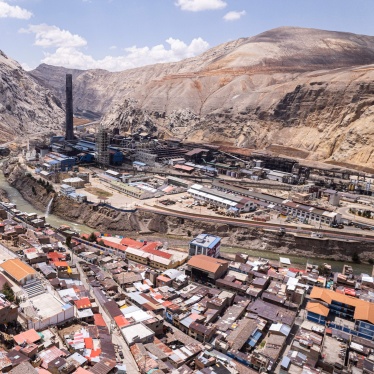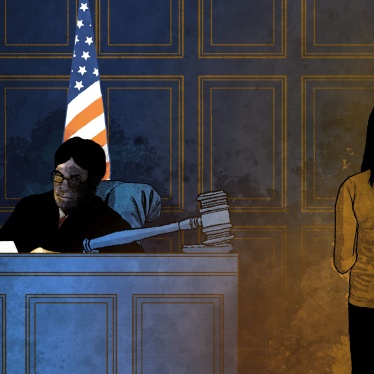Human Rights Watch welcomes the opportunity to comment on the Draft OECD Due Diligence Guidance for Responsible Business Conduct (“Guidance”). Human Rights Watch is an international nongovernmental human rights organization that is working in over 90 countries globally. For more than two decades we have documented human rights abuses in the context of global supply chains in agriculture, the garment and footwear industry, mining, construction, and other sectors. We have interviewed thousands of workers, employers, and government officials, and engage regularly with businesses and governments regarding their responsibilities to protect human rights.
The need for a binding international standard on business and human rights
Governments have the primary responsibility to protect human rights, including in the context of global supply chains. To meet this responsibility, they should regulate the business sector both domestically and abroad. We have seen that where states have imposed mandatory due diligence, company transparency and accountability has been improved, but often, States do not sufficiently regulate businesses to meet their human rights obligations.
Many key human rights responsibilities of businesses are already spelled out in a number of non-binding voluntary standards, including the United Nations Guiding Principles on Business and Human Rights. The Guiding Principles and other voluntary standards provide a clear and widely-accepted model of responsible business practice. But while some companies take their human rights responsibilities seriously, other companies have taken little or no action to implement due diligence measures. As a result, human rights abuses related to the economic activities of businesses remain common, affecting millions of workers around the globe.
The creation of the proposed voluntary guidance would therefore be of limited effectiveness. Human Rights Watch believes that the best way to strengthen human rights due diligence in the context of business operations is to create a new, legally binding international standard to oblige governments to require businesses to conduct human rights due diligence in global supply chains.[1] We understand that the OECD’s goal here is to create a non-binding instrument that spells out recommendations laid down in the (non-binding) Guidelines for Multinational Enterprises. However, it does have the capacity to adopt legally binding standards as it did with the Anti-Bribery Convention.
- Recommendation: The OECD Due Diligence Guidance for Responsible Business Conduct and OECD Guidelines for Multinational Enterprises should become a binding standard.
Comments on the content of the draft Guidance
Alignment with existing human rights standards
It is vital that the Guidance recognizes and explicitly names international human rights standards as a foundation and core concept in Part I. While the Guidance mentions several important standards such as the International Labour Organization (ILO) Conventions, it should also specifically name core human rights instruments, including the International Covenant on Civil and Political Rights, the International Covenant on Economic, Social, and Cultural Rights, the UN Convention on the Rights of the Child, and several other treaties, listed in full by the Office of the High Commissioner for Human Rights.[2]
The Guidance includes discussion of proportionality of response to risks and harm, with priority given to severe harm or human rights abuses. However, great care needs to be taken that less severe human rights problems are not simply ignored next to an exclusive focus on the most severe potential harms. In cases where an enterprise is unable or unwilling to take effective steps to prevent, mitigate, or remediate human rights abuses, the Guidance should encourage enterprises to consider halting activities linked to those abuses, or disengaging with suppliers that are linked to the human rights abuse until or unless a viable mitigation strategy is found.[3]
In relation to children’s rights, the Guidance should specifically recognize and build upon the General Comment issued by the UN Committee on the Rights of the Child on State obligations regarding the impact of the business sector on children’s rights.[4]
- Recommendation: The OECD Due Diligence Guidance for Responsible Business Conduct should explicitly mention ILO and core human rights standards as its foundation. In its introduction and in Part II-A, the Guidance should explain that any violation or abuse of the rights enshrined in these human rights standards is considered an adverse impact. It should also explicitly recognize the content of the General Comment on child rights in the context of business operations.
Transparency and disclosure
Transparency and disclosure are central to ensuring robust due diligence and effective outcomes. Transparency should be included and emphasized throughout the Guidance, in particular that relevant, accurate, timely, current, and accessible disclosure is necessary at every step of the iterative due diligence process. In addition, transparency around due diligence policies, methodologies, and remediation methods will provide a greater predictability in the process, particularly for affected stakeholders.
Transparency is particularly important with regard to supply chains. Enterprises should disclose the names and locations of the entities along its supply chain, from subsidiaries to subcontracted suppliers or service providers. Business relationships with financial institutions should also be disclosed.
- Recommendation: The OECD Due Diligence Guidance for Responsible Business Conduct should make the transparency recommendations more robust by including disclosure throughout the due diligence process and of supply chain business relationships.
Monitoring implementation
The goal of the Guidance is to improve business conduct by implementing the due diligence recommendations of the OECD Guidelines for Multinational Enterprises. While the Guidance encourages companies to track their own due diligence processes, it contains very little information on how States will monitor and measure implementation. This is a major oversight.
Human Rights Watch believes that a formal assessment is needed to measure how States are implementing the OECD Due Diligence Guidance for Responsible Business Conduct. Adhering States should report regularly and publicly on (i) what activities they have undertaken to promote and monitor implementation of the Guidance; (ii) the number and overall proportion of companies who are reporting on their due diligence policies and practices in accordance with Part II-D of the Guidance; and (iii) the number of reporting companies that are, in the state’s assessment, undertaking due diligence in accordance with the Guidance. The OECD should set up a monitoring mechanism that assesses progress on the implementation of the Guidance in each State.
- Recommendation: The OECD Due Diligence Guidance for Responsible Business Conduct should include a mechanism to monitor implementation.
Accountability and remedy
The Guidance does not go far enough to ensure effective remediation processes where harm was not prevented or only partly mitigated. Enterprises should make an effort to assess the possibility of remediating potential abuses as part of the due diligence process. As part of the “specific response plans” described in Part II-B, enterprises should identify and disclose the methods by which affected parties can raise concerns about future impacts, whether through judicial or non-judicial mechanisms.[5]
The Guidance should also strongly encourage enterprises that are directly linked to human rights abuses, but that are not causing or contributing to that harm, to ensure that just, fair, and effective remedial processes are in place. This is particularly important in the context of supply chains, particularly where enterprises rely on goods and services from companies with risky business practices.
- Recommendation: The OECD Due Diligence Guidance for Responsible Business Conduct should include remediation planning and disclosure as part of its due diligence process. Remediation should be strongly encouraged throughout a supply chain, even when an enterprise is only directly linked to harm.
[1] Human Rights Watch, Human Rights in Supply Chains: A Call for a Binding Global Standard on Due Diligence, May 2016, https://www.hrw.org/report/2016/05/30/human-rights-supply-chains/call-binding-global-standard-due-diligence.
[2] Office of the United Nations High Commissioner for Human Rights, “The Core International Human Rights Instruments and their monitoring bodies,” undated, http://www.ohchr.org/EN/ProfessionalInterest/Pages/CoreInstruments.aspx (accessed February 1, 2017).
[3] Organisation for Economic Co-operation and Development (OECD), “OECD Guidelines for Multinational Enterprises, II: Commentary on General Policies,” 2011, http://www.oecd.org/daf/inv/mne/48004323.pdf (accessed February 6, 2017), pp. 21-22. See also “OECD Due Diligence Guidance for Responsible Supply Chains of Minerals from Conflict-Affected and High-Risk Areas,” 2016, http://www.oecd.org/daf/inv/mne/OECD-Due-Diligence-Guidance-Minerals-Edition3.pdf (accessed February 6, 2017).
[4] UN Committee on the Rights of the Child, “General Comment No. 16 (2013) on State obligations regarding the impact of the business sector on children’s rights,” CRC/C/GC/16 (2013), http://www.refworld.org/docid/51ef9cd24.html (accessed February 1, 2017).
[5] Non-judicial grievance mechanisms should also be designed in consultation with stakeholder groups for whom the mechanism is intended. Office of the UN High Commissioner for Human Rights, “Guiding Principles on Business and Human Rights: Implementing the United Nations ‘Protect, Respect and Remedy’ Framework,” 2011, http://www.ohchr.org/Documents/Publications/GuidingPrinciplesBusinessHR_EN.pdf (accessed February 6. 2017).








